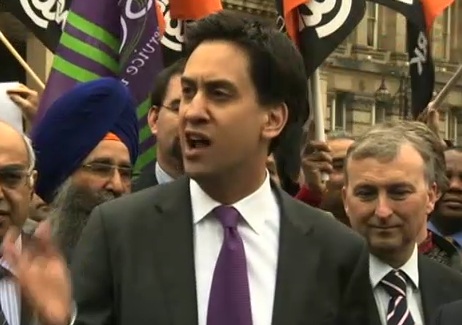Labour’s union plans are about culture as much as cash

Henry G Manson’s Friday column
Lord Collins’ interim proposals for Labour’s relationship with its affiliated unions were published yesterday. They don’t settle the issue of union funding and affiliation to Labour. In fact it provides more questions than answers. But while much of the attention has previously been on the pounds, shilling and pence that would be lost, it’s clear that these plans are about so much more than that. Together the proposals demand an organisational and cultural shift from unions in the way they relate to the party.
Ed Miliband’s plans are much more demanding, radical and challenging than many commentators think. It’s not about writing smaller cheques but actually about transforming the way affiliated unions work on the ground.
There’s plenty of motherhood and apple pie in Lord Collins’ text on the role unions had in forming the party, reassuring them of the importance of their collective voice and that the party’s rules have changed throughout its history and so on. The heart of the issue is that Labour affiliated unions would have to heavily invest at a grassroots level in the way they organise in the party or their influence will diminish. General Secretaries will have less power. Forget this suggestion they’ll have more money to donate with – their union executives and members won’t allow them and future spending caps prohibit it.
The fact that only 10-15% of affiliated union members will want to opt-in and join the Labour Party will lead to millions of pounds less money for the party. The flipside is that it will mean more members and in theory greater activism. Union influence would be as strong or as weak as its involvement on the ground.
For example Collins proposes having primaries to select candidates in dwindling constituency parties. This provides a different challenge for unions. Yes, unions could still rally around a single candidate in a selection contest but they’d have to persuade many more members including non-members that they were the right person. If they get it right and choose candidates with broad local appeal then its an opportunity. If not then they’ll flounder.
Clearer caps on the spending in selection contests and in leadership and deputy leadership elections will undermine the impact of the trade union cheque book – along with the personal wealth of other candidates or the private donations they may attract. Instead of an arms race on who could amass the most money for glossy mailings to members. Aspiring candidates will have to do more to persuade individuals from a level playing field.
Whatever form of selection for parliamentary candidate, unions will have to engage many more individual members in the Labour Party and then ensure candidates they support have that broad appeal. The latter isn’t as challenging as the former. The calibre of trade union backed Labour candidate in Labour selections is currently higher than it has been for a generation. But the issue of persuading so many more members to join Labour could be problematic.
Unison General Secretary Dave Prentis recoiled at this recently telling the Labour List blog, “We are not putting more on our application form saying ‘do you want to be an associate member of the Labour Party?’. It’s up to the Labour Party to recruit Labour members
At a time when unions are defending the industrial concerns of members it’s tough to demand more of their energy, effort and resource should be channelled into something that was previous achieved almost automatically, albeit bureaucratically. It’s not just the unions that will have a bit of a headache – the Labour party will have to appeal to trade union members too. These members may not quite share the politics of their elected leadership, but they could be harder to motivate and will certainly demand more policies than the party is currently offering.
There currently is no union that will thrive under the Collins proposals without first adjusting the way they work and view their relationship with the Labour Party. It would take time for them to change and if Labour is to have any chance of winning their consent then it will need to allow a lead-in time of a year or two to prepare the ground for this new way of working.
Ed Miliband’s plans are easily more radical than Tony Blair’s Clause 4 changes which essentially involved changing a mission statement on membership cards. These proposals provide unions with a real challenge. It’s one some will be better equipped to accept than others. Will they get passed? It’s still too early to tell but the different union responses will be revealing.